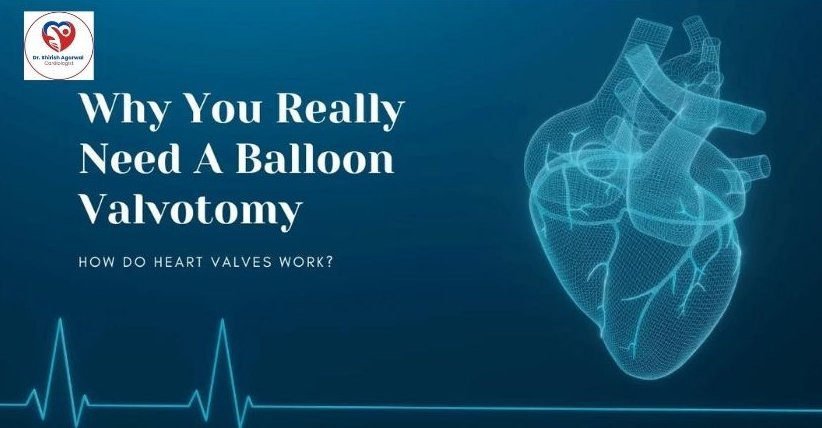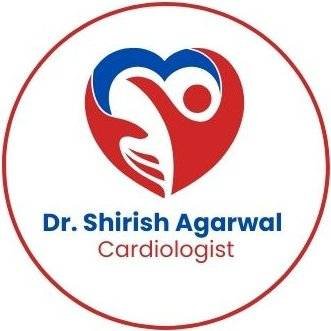Balloon Mitral Valvotomy (BMV)
What is Balloon Mitral Valvotomy (BMV)?
Best Balloon Mitral Valvotomy (BMV) is a minimally invasive procedure used to treat mitral stenosis, a condition where the mitral valve of the heart is narrowed, restricting blood flow from the left atrium to the left ventricle. The procedure involves using a balloon catheter to widen the narrowed valve, improving blood flow and alleviating symptoms. Dr. Shirish Agarwal, the best cardiologist in Indore, offers expert care and BMV treatment in Indore, ensuring effective management of mitral stenosis.

Symptoms of Balloon Mitral Valvotomy (BMV)
Shortness of Breath
Patients with mitral stenosis often struggle to breathe, especially during physical activity or when lying down, due to reduced blood flow through the narrowed valve.
Fatigue
Reduced blood flow leads to overall tiredness and weakness, as the body does not receive enough oxygenated blood.
Palpitations
The strain on the heart from the narrowed valve can cause irregular heartbeats or a sensation of fluttering in the chest.
Chest Pain
Some patients may experience discomfort or pain in the chest, particularly during exertion, as the heart struggles to pump blood effectively.
Swelling
Poor circulation caused by mitral stenosis can lead to fluid buildup in the legs, ankles, or abdomen.
Frequent Respiratory Infections
Mitral stenosis increases pressure in the lungs, making patients more susceptible to respiratory infections.
Causes of BMV
Rheumatic Fever
Rheumatic fever, an inflammatory disease, commonly causes mitral stenosis by damaging the mitral valve.
Congenital Heart Defects
Additionally, some individuals are born with mitral valve abnormalities. Over time, these abnormalities can lead to stenosis.
Calcium Deposits
As people age, calcium deposits begin to form around the mitral valve. Consequently, this process causes the valve to narrow and stiffen.
Radiation Therapy
Moreover, previous radiation treatment to the chest area damages the mitral valve. As a result, this damage can lead to stenosis.
Dr. Shirish Agarwal, the best cardiologist in Indore, offers expert care and BMV treatment in Indore, identifying and addressing the underlying causes to provide effective treatment.
Benefits of BMV
Improved Blood Flow
BMV effectively widens the narrowed mitral valve. As a result, this improvement allows for better blood flow from the left atrium to the left ventricle.
Symptom Relief
Patients often experience significant relief from symptoms. For instance, they notice reductions in shortness of breath, fatigue, and chest pain after the procedure.
Minimally Invasive
Additionally, BMV involves smaller incisions and shorter recovery times. Consequently, this technique is less invasive than open-heart surgery.
Reduced Risk of Complications
Furthermore, by improving valve function, BMV reduces the risk of complications. Specifically, it lowers the chances of developing atrial fibrillation and heart failure.
Dr. Shirish Agarwal, the best cardiologist in Indore, offers expert care and BMV treatment in Indore, ensuring patients benefit from this effective and minimally invasive procedure.
Preparation for BMV
Medical Evaluation
A thorough assessment confirms the severity of mitral stenosis. This assessment includes the patient's medical history, a physical examination, and diagnostic tests such as echocardiography.
Pre-procedure Testing
Healthcare providers conduct blood tests, electrocardiograms (ECG), and imaging studies. These evaluations help assess overall health and plan the procedure effectively.
Medication Review
Patients receive detailed information about the procedure and learn what to expect. Additionally, they understand how to prepare, including following fasting instructions and adhering to medication guidelines.
Patient Education
Patients receive detailed information about the procedure. They learn what to expect and understand how to prepare. This preparation includes following fasting instructions and adhering to medication guidelines.
Dr. Shirish Agarwal, the best cardiologist in Indore, offers expert care and BMV treatment in Indore, ensuring comprehensive preparation for the procedure.
Treatment of BMV
Balloon Catheter Insertion
Under local anesthesia and sedation, the healthcare team inserts a balloon-tipped catheter through a vein in the groin. They then guide it to the mitral valve for the procedure.
Balloon Inflation
Once in position, the team inflates the balloon. This action widens the narrowed mitral valve and improves blood flow significantly.
Monitoring and Adjustments
The imaging team closely monitors the procedure using advanced imaging techniques. Additionally, they make necessary adjustments to ensure optimal results.
Post-procedure Care
After the procedure, the staff closely monitors patients in a recovery area. Then, they discharge patients with specific care instructions to ensure a smooth recovery.
Dr. Shirish Agarwal, the best cardiologist in Indore, offers expert care and BMV treatment in Indore, utilizing advanced techniques to ensure effective treatment.
Recovery from Balloon Mitral Valvotomy (BMV)
Hospital Stay
Patients may need to stay in the hospital for a day or two for monitoring after the procedure. Additionally, this monitoring ensures that any potential complications are promptly addressed.
Follow-up Appointments
Regular follow-up visits are scheduled to monitor the patient's recovery and valve function. Furthermore, these appointments help the healthcare team track progress and make any necessary adjustments to the treatment plan.
Activity Restrictions
Patients are advised to avoid strenuous activities for a few weeks. In addition, they should follow a gradual return to normal activities to ensure proper healing and recovery.
Medication Management
Ongoing medications may be prescribed to manage symptoms effectively. Moreover, these medications aim to prevent complications that could arise after the procedure.
Dr. Shirish Agarwal, the best cardiologist in Indore, offers expert care and BMV treatment in Indore, ensuring comprehensive support during the recovery phase.
Conclusion
Balloon Mitral Valvotomy (BMV) is a vital procedure for treating mitral stenosis. This procedure offers significant symptom relief and improves blood flow through a minimally invasive approach. Furthermore, Dr. Shirish Agarwal, the best cardiologist in Indore, provides expert care and BMV treatment in Indore. He delivers tailored and comprehensive care to ensure optimal heart health and improved quality of life for his patients.
Frequently Asked Questions
Balloon Mitral Valvotomy (BMV) is a minimally invasive procedure used to treat mitral stenosis, where the mitral valve becomes narrowed, restricting blood flow. The procedure involves inflating a balloon to widen the valve. Dr. Shirish Agarwal, the best cardiologist in Indore, offers expert care and Balloon Mitral Valvotomy (BMV) treatment in Indore.
Candidates for BMV typically include patients with symptomatic mitral stenosis who have suitable valve anatomy for balloon dilation. Dr. Shirish Agarwal, the best cardiologist in Indore, offers expert care and Balloon Mitral Valvotomy (BMV) treatment in Indore, ensuring a thorough evaluation to determine candidacy.
BMV is performed by inserting a balloon-tipped catheter through a vein in the groin and guiding it to the heart. Once in place, the balloon is inflated to open the narrowed mitral valve. Dr. Shirish Agarwal, the best cardiologist in Indore, offers expert care and Balloon Mitral Valvotomy (BMV) treatment in Indore, using advanced techniques for optimal outcomes.
The benefits of BMV include improved blood flow, relief from symptoms like shortness of breath and fatigue, and a minimally invasive approach with shorter recovery times. Dr. Shirish Agarwal, the best cardiologist in Indore, offers expert care and Balloon Mitral Valvotomy (BMV) treatment in Indore, ensuring patients gain these significant benefits.
Risks of BMV may include bleeding, infection, valve damage, or stroke. However, these risks are minimized with careful patient selection and skilled performance. Dr. Shirish Agarwal, the best cardiologist in Indore, offers expert care and Balloon Mitral Valvotomy (BMV) treatment in Indore, prioritizing patient safety.
Recovery time for BMV typically involves a short hospital stay followed by a few weeks of limited activity. Most patients can resume normal activities within a month. Dr. Shirish Agarwal, the best cardiologist in Indore, offers expert care and Balloon Mitral Valvotomy (BMV) treatment in Indore, supporting patients through the recovery process.
